Dec 8, 2012 update: APP says it did not hire Covington & Burling to help with sustainability issues.
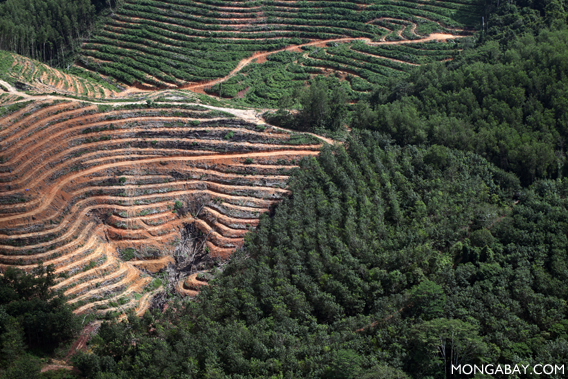
Industrial timber plantation in Borneo. Photo by Rhett A. Butler.
Indonesian forestry giant Asia Pulp & Paper (APP) has hired a top U.S. official to help it work through trade and environmental issues.
In November, APP announced it had retained Stuart Eizenstat of Covington & Burling, a U.S.-based law firm, to help “ensure APP’s trade and sustainability compliance in North America”. Eizentstat’s hiring is notable because he led the U.S. delegation that negotiated the Kyoto Protocol and has served in a number of high-level government positions, including U.S. Ambassador to the European Union; Under Secretary of Commerce for International Trade; Under Secretary of State for Economic, Business and Agricultural Affairs; and Deputy Secretary of the Treasury in the Clinton Administration. Eizentstat has also advocated for the adoption of forest carbon credits in a national plan to address climate change.
In an interview with mongabay.com, Eizentstat confirmed that his team from Covington & Burling is working with APP.
“We are engaged with APP to support both trade relations and environmental issues. There seems to be an abundance of misinformation and confusion over the economic, environmental and social issues surrounding Indonesia and companies like APP who are based there,” he said. “APP is an organization of change. I am optimistic that my many years of expertise in sustainability and forestry issues, and the fact I led the U.S. government negotiations on the Kyoto Protocol, as well as helping large organizations propel their sustainability programs, will be valuable in helping APP progress.”
APP hopes Eizentstat’s hiring can boost support for its “Sustainability Roadmap,” which was unveiled in May and aim to address criticism of its environmental record. A range of green groups and human rights organizations have staged long-running campaign against APP for its practices, which include converting large tracts of peatlands and rainforests for industrial plantations, triggering substantial greenhouse gas emissions. Critics say these plantations have at times sparked or exacerbated conflict with local forest-dependent communities and further jeopardized numerous endangered species like the Sumatran tiger. These complaints have intensified in recent years as APP has sought to boost its pulping capacity, putting more forest at risk.
|
APP’s trade issue
In 2010 the Department of Commerce ruled against APP, imposing anti-dumping and countervailing duties for “dumping” paper on the U.S. market at “artificially low prices” and “threatening U.S. jobs and U.S. industry ‘with material injury by reason of less-than-fair-value imports of certain coated paper from Indonesia.'” Following the ruling, APP stepped up its public relations in the United States. At the same time groups like Consumer Alliance for Global Prosperity and the Coalition to Protect Virginia Jobs emerged. These groups, which aligned themselves with the Tea Party movement, criticize companies that have stopped carrying APP products and campaign against WWF and Greenpeace, both of which have pressured APP on its environmental record. |
APP’s responses to these campaigns have not endeared it to green groups. It promised to phase out logging of natural forests, but missed three self-imposed targets since 2004. APP also had a public falling-out with the Forest Stewardship Council (FSC), a timber certification body, after it failed to preserve areas designated as high-conservation value by FSC’s conservation partner, the Rainforest Alliance. Meanwhile APP’s critics have been targeted with campaigns accusing them of being pro-poverty and anti-Indonesia. But APP’s woes have been exacerbated by its approach to public relations, which at times has included claims that are openly questioned by NGOs, including “conservation initiatives” which have later been shown to be nothing more than compliance with Indonesian law or in one case, non-existent. One APP affiliate abroad was even caught “astroturfing,” or attempting to make it look like it had grassroots support behind its campaign. The troubles surrounding APP have cost it dozens of customers around the world.
Eizenstat told mongabay he is no stranger to these critiques, but defended APP.
“Of course, I am aware of these criticisms,” he said. “Many of these claims are caused by confusion or misinformation, and some are simply inaccurate. For example, this year, an environmental NGO alleged that APP was pulping the protected Ramin tree species. This is simply untrue. In fact, in May, the Indonesian Ministry of Forestry cleared APP of all these incorrect allegations, as you can see from reports in news outlets ranging from the Jakarta Globe, to Environmental Leader, to PrintWeek. You can also see the Ministry of Forestry’s clearance of APP for yourself, here.”

Forest clearing by PT Asia Tani Persada in late September 2012. Courtesy of Greenpeace.
The ramin case
In March, Greenpeace released a report asserting that APP had cleared ramin trees, which are listed under CITES appendix II and are therefore protected from cutting under Indonesian law. The report was based on a year long undercover investigation.
Following the release of the report, the Ministry of Forestry said it would investigate the allegations. But Greenpeace said the ministry waited too long to start its probe.
“The Ministry of Forestry sat on the evidence provided by Greenpeace for more than a month after we gave it to them,” Greenpeace forest campaigner Andy Tait told mongabay.com. “During that time, unsurprisingly, APP cleaned up its log yards.”
In the video referenced by Eizenstat, Darori, Director General of Forest Protection and Nature Conservation at the Ministry of Forestry, made a statement saying a “preliminary investigation” had cleared APP of wrongdoing, instead implicating its suppliers for supplying ramin logs. However, the Ministry of Forestry has yet to release the results of the investigation, which closed some eight months ago. Darori — whose statement was made at an APP press conference, rather than the Ministry of Forestry — has not responded to multiple requests for comment from Mongabay-Indonesia.
But Ministry of Forestry documents released by Greenomics, an Indonesian NGO, clearly show the presence of ramin trees in APP concessions.
“If [Eizenstat] and the Director General of Forest Protection and Nature Conservation took the time to take a detailed look at the legal documents of APP’s pulpwood plantation business plans, I am sure that they would be more careful to comment about the clearance of Ramin trees in the APP’s pulpwood concessions,” Greenomics Director Elfian Effendi told mongabay.com. “The legal documents show that most of APP’s concession blocks containing ramin trees have been cleared… The inventory tables show that the ramin trees are in the areas that have been cleared.”
Whether or not these ramin trees were actually pulped, or merely cleared for acacia, remains unresolved. According to Greenpeace, APP recently amended its procurement policy so ramin logs will no longer be off-limits. Meanwhile in his video address at APP’s press conference, Darori suggested that APP secure permits for ramin harvesting, which would effectively eliminate the issue in the future.
For its part, APP said it would impose sanctions on the apparently wayward suppliers. But the paper giant has yet to do so publicly, according to Greenpeace’s Tait.
“Despite regularly claiming a ‘zero tolerance’ for illegal timber it’s interesting to note that APP, whilst admitting the presence of illegal ramin logs at its mill, announced no actions against it’s suppliers who brought them there. Neither has the company been able to provide any evidence of a supposed ‘ quarantine area’ where it claims Greenpeace identified these logs.”
“Stuart Eizenstat’s comments suggest that he has little intention of offering APP critical or constructive advice – he appears content to simply read straight from the company’s PR scripts.”
A new plan and continuing skepticism
Given this track record, it comes as little surprise that when APP announced a new “Sustainability Roadmap” in May, most of APP’s critics were skeptical. Some thought the language actually represented a step back from previous commitments, with loopholes for ongoing use of fiber sourced through logging of natural forests. Concerns were also raised about a giant new mill slated for South Sumatra that is linked to Sinar Mas, a group of companies that includes APP and its suppliers. Independent analysis suggests that there isn’t enough local plantation fiber to meet that new mill’s production capacity, necessitating ongoing logging of natural forests.
 |
But some are hopeful that this time might be different for APP. One of these is The Forest Trust, a group that works with companies to improve the environmental performance of their supply chains. In February, the Forest Trust (TFT) began working with APP to implement and monitor a new sustainability program under APP’s “Roadmap”. TFT’s involvement is noteworthy because in 2011 it helped Golden Agri Resources (GAR), Indonesia’s largest palm oil company and under the same ownership as APP, establish a forest conservation policy that excludes conversion of land that has more than 35 tons of carbon (effectively peatlands and rainforests) and requires free, prior, and informed consent (FPIC) in dealing with local communities. The measures immediately moved GAR — which had been the target of a brutally effective Greenpeace campaign that cost it tens of millions of dollars in lost contracts — to the forefront of environmental policy among Indonesian palm oil companies. Whereas two years ago, GAR was suffering from sustained customer defections, in September there was sufficient good will or market optimism for GAR to raise $400 million via a bond offering. APP is in a similar position financially — it is seeking to raise hundreds of millions of dollars for mill expansion and plantation development.
Eizenstat believes the same transformation can happen with APP.
“I believe that APP is heading in the right direction, one which should be encouraged,” he told mongabay.com. “It is a long road and it will not happen overnight, but it is clear that APP is sincere in its goal of becoming one of the most sustainable large paper companies in the world. I understand their difficulties in balancing the competing priorities of sustainability, legality, poverty, economic growth and development and welcome your questions as a means of beginning a dialogue that leads to a better understanding of APP and these issues.”
But Greenpeace’s Tait is less optimistic.
“APP faces a myriad of serious environmental, trade and debt problems but up to now there is little evidence of genuine reform in its practices. The hiring of yet another well connected advisor suggests that the company is more interested in throwing money at its problems to make them go away.”
|
Comment from APP – December 08, 2012 APP is delighted to welcome Ambassador Eizenstat to our family of advisors. He will provide expert counsel on trade related issues for APP, in particular in North America. Ambassador Eizenstat is not advising on environmental or sustainability issues, or helping ‘green’ APP’s image in any way. Our sustainability strategy, as outlined in our APP Sustainability Roadmap ‘Vision 2020’ reflects our commitment, based on a multi-stakeholder approach, to forest protection and continuous improvement. We are prepared to be judged purely based on the implementation of our Rodamap on the ground. Aida Greenbury Mongabay.com response Our reporting here is based on an interview with Ambassador Eizenstat as well as a press release issued by APP November 8, 2012. The press release states: “Asia Pulp & Paper Group (APP), one of the world’s largest paper manufacturers, today announced that it has partnered with Covington & Burling LLP, a leading international law firm, and the head of its international practice, former Ambassador Stuart Eizenstat, to support APP’s programs to ensure APP’s trade and sustainability compliance in North America.” The press release goes on to highlight both Eizenstat’s experience in forestry and environmental issues (rather than his experience with trade issues) as well as APP’s 2020 Sustainability Roadmap:
APP launched its 2020 Sustainability Roadmap in June. The Roadmap encompasses a set of sustainability goals that includes a determination to become wholly reliant on tree plantations for raw materials sourced in Indonesia by 2015. The company also suspended all natural forest clearance on its plantations, with independent auditors now conducting assessments of APP’s commitment to the internationally-accepted principles of High Conservation Value Forest (HCVF). Therefore I stand by my reporting in this article. – Rhett A. Butler, mongabay.com |
Related articles
Rights groups, environmentalists aim to block funding for new Sumatran pulp mill
(11/16/2012) A coalition of more than 60 civil society groups has warned bankers and insurers not to invest in a massive new mill slated for construction on the island of Sumatra. The NGOs say the mill will drive deforestation and increase conflict in a region already wracked with social and environmental problems.
APP overstates significance of its logging moratorium in Indonesia, says report
(10/25/2012) Beleaguered forestry giant Asia Pulp & Paper (APP) is overstating the conservation significance of its recently announced moratorium on forest conversion on the islands of Sumatra and Borneo, argues a new report issued by an Indonesian activist group.
Sustainability pact aside, Greenpeace says paper giant APP must stop facilitating deforestation
(09/27/2012) Asia Pulp & Paper (APP) must stop accepting timber sourced from clearance of rainforests and peatlands for its sustainability pact to have any credibility, says Greenpeace.
In eco-pact, will controversial paper giant APP turn over a new leaf?

(09/26/2012) Over the past decade-and-a-half there has arguably been no paper supplier as controversial as Asia Pulp & Paper (APP), an umbrella brand for several Indonesian forestry companies. The paper giant has been dogged by allegations that is destroying key wildlife habitat, driving substantial greenhouse gas emissions through the conversion of peat forests, dispossessing local communities of land, and engaging in a heavy-handed campaign to undermine its critics within Indonesia and abroad. Its reputation hasn’t be helped by its financial record — in 2001 it defaulted on $13.9 billion in debt, making it difficult for APP to raise money for expansion.
APP establishes deforestation moratorium in Jambi; greens remain skeptical
(09/06/2012) Asia Pulp & Paper (APP) has established a moratorium on natural forest conversion in Jambi province on the island of Sumatra, according to a report issued by the Indonesian forestry giant.
Indonesia’s pulp and paper targets incompatible with green growth goals

(08/10/2012) Indonesia’s pulp and paper targets incompatible with green growth goals Indonesia’s ambitious targets for boosting pulp and paper production to make it the world’s lowest-cost producer are at odds with its push for green economic growth should expansion proceed on its current business-as-usual path, said a forestry expert presenting at the annual meeting of the Association for Tropical Biology and Conservation (ATBC) in Bonito, Brazil.
APP’s new ‘sustainability roadmap’ won’t spare unprotected tiger habitat in Sumatra
(07/27/2012) Asia Pulp & Paper’s new sustainability commitment represents a scaling back of earlier environmental pledges and does not offer new protection for natural forests in Sumatra, alleges a new report from Eyes on the Forest, a coalition of green groups based in Riau, Sumatra.
Palm oil giant making good on forest commitment in Indonesia, finds independent analysis

(05/29/2012) Palm oil giant PT SMART appears to be honoring its commitment to avoid conversion of high carbon forests in Indonesian Borneo, reports a new assessment published by Greenomics, an Indonesian environmental activist group. The report was issued 15 months after PT SMART — a subsidiary of Singapore-based Golden Agri Resources (GAR) and owned by Indonesia’s Sinarmas Group — signed a landmark agreement with The Forest Trust (TFT) to spare forests and peatlands that have more than 35 tons of carbon per hectare. The deal came after a damaging Greenpeace campaign, which targeted PT SMART for clearing orangutan habitat in Kalimantan and cost the company millions of dollars in contracts.
Another red herring from Asia Pulp & Paper on its deforestation problem

(05/29/2012) In a press release issued last Thursday, Asia Pulp & Paper (APP) asserted that the presence of mixed tropical hardwood fiber (MTH) in its products ‘does not come from the felling of virgin tropical rainforest trees in Indonesia’. The embattled paper giant goes on to say that ‘the presence of MTH fiber says nothing about whether the product is sustainable or not” and that “MTH can be found easily in recycled paper.’ All these points are true. But what APP doesn’t tell you is that its response is yet another facade in its effort to deflect criticism from its forestry practices.
New attack on Greenpeace in Indonesia
(05/01/2012) As fallout from its campaign against Asia Pulp & Paper grows, Greenpeace’s critics have opened a new front on the environmental group, accusing it of “embezzlement”, reports Mongabay-Indonesia.
After illegal logging allegations, certifier lodges complaint against paper giant APP
(03/07/2012) Less than a week after Greenpeace released evidence that protected tree species were being illegally logged and pulped at an Asia Pulp and Paper (APP) mill in Sumatra, a major certifier, the Program for the Endorsement of Forest Certification (PEFC), has lodged a complaint and asked for an investigation. In addition to PEFC’s move, the National Geographic Society (NGS), which was found to be sourcing from APP recently, has publicly broken ties with the company, and Greenpeace has handed over its evidence to Indonesian police who told the group there would be an investigation.
Investigation links APP to illegal logging of protected trees

(03/01/2012) A year-long undercover investigation has found evidence of Asia Pulp and Paper (APP) companies cutting and pulping legally protected ramin trees, a practice that violates both Indonesian and international law. Found largely in Sumatra’s peatswamp forests, the logging of ramin trees (in the genus Gonystylus) has been banned in Indonesia since 2001; the trees are also listed under Appendix II of the Convention on International Trade in Endangered Species (CITES) and thus require special permits to export. The new allegations come after APP, an umbrella paper brand, has lost several customers due to its continued reliance on pulp from rainforest and peatland forests in Sumatra.
Paper giant hammered on forest certification claims
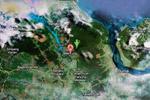
(02/15/2012) Beleaguered paper giant Asia Pulp & Paper was sharply criticized Wednesday for its claims that its operations are certified sustainable by independent auditors. WWF said its survey of certifiers and certification schemes shows that none apply to ‘the most controversial operations’ of APP’s suppliers: clearing of rainforests and peatlands that are home to endangered tigers, elephants, and orangutans. In responding to complaints from environmentalists that its operations are responsible for large-scale destruction of native forests, APP often touts various certification standards which it says demonstrate its commitment to sustainability. Yet the new WWF survey found that these standards don’t apply across all of the paper giant’s operations — APP’s suppliers in Indonesia continue to harvest and convert natural forests. Nor do the certification standards necessarily prove that APP’s forest management practices are ‘sustainable’.
WWF: Asia Pulp & Paper misleads public about its role in destroying Indonesia’s rainforests
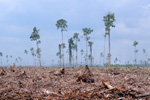
(12/16/2011) Asia Pulp & Paper (APP) continues to mislead the public about its role in destroying rainforests and critical tiger habitat across the Indonesian island of Sumatra, alleges a new report from Eyes on the Forest, a coalition of Indonesian environmental groups including WWF-Indonesia. The report, titled The truth behind APP’s Greenwash, is based on analysis of satellite imagery as well as public and private documentation of forest cleared by logging companies that supply APP, which is owned by the Indonesian conglomerate, Sinar Mas Group (SMG). The report concludes APP’s fiber suppliers have destroyed 2 million hectares of forest in Sumatra since 1984.
Greenpeace NZ: APP misrepresented test results
(11/27/2011) Asia Pulp & Paper (APP) misled the public when the paper products giant claimed a paper testing company had found its fiber clear of rainforest fiber, says Greenpeace.
Report questions legitimacy of Asia Pulp & Paper’s conservation initiatives

(11/22/2011) A new report by an Indonesian environmental group casts doubt on Asia Pulp & Paper’s commitment to sustainability. In its corporate social responsibility reports and advertisements, Asia Pulp & Paper (APP), one of Indonesia’s largest pulp and paper suppliers, has touted several forest reserves as indicators of its commitment to environmental stewardship. APP has portrayed these as voluntary, goodwill efforts to conserve Sumatra’s endangered wildlife. But in a new report, Greenomics-Indonesia, a Jakarta-based NGO, says that at best these projects represent compliance with existing Indonesian laws or are in areas where commercial exploitation isn’t viable.
War of words between Greenpeace, Asia Pulp & Paper over deforestation allegations
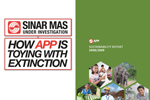
(11/16/2011) Greenpeace and Asia Pulp & Paper (APP), a giant global paper supplier, are locked in a heated battle over the activist group’s allegations that APP products contain fiber sourced from the destruction of forests in Indonesia. At stake is APP’s access to some of the world’s most lucrative markets. Until APP provides solid evidence refuting Greenpeace’s accusation that its pulp and paper production isn’t coming at the expense of natural forests in Indonesia, APP will have a difficult time winning over critics.
Barbie, Legos, other toys linked to destruction of Indonesia’s rainforests

(06/07/2011) Some of the world’s largest and most prominent toy-makers are sourcing their packaging materials from companies linked to large-scale destruction of Indonesia’s rainforests, alleges a new report from Greenpeace. The report, How APP is Toying with Extinction, is based on forensic analysis of toy packaging from Mattel, which manufacturers Barbie and Hot Wheels toys; Disney, which makes a variety of toys linked to its movies; Hasbro, which produces GI Joe, Star Wars, and Sesame Street toys and various games like Monopoly and Scrabble; and Lego, which makes the iconic plastic building blocks. The analysis found traces of mixed-tropical hardwood (MTH) and acacia fiber which are principally sourced from Asia Pulp & Paper (APP), an umbrella paper products brand that sources from several companies that have been linked to rainforest destruction in Sumatra.
Pulp and paper firms urged to save 1.2M ha of forest slated for clearing in Indonesia
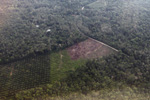
(03/17/2011) Indonesian environmental groups launched a urgent plea urging the country’s two largest pulp and paper companies not to clear 800,000 hectares of forest and peatland in their concessions in Sumatra. Eyes on the Forest, a coalition of Indonesian NGOs, released maps showing that Asia Pulp and Paper (APP) and Asia Pacific Resources International Limited (APRIL) control blocks of land representing 31 percent of the remaining forest in the province of Riau, one of Sumatra’s most forested provinces. Much of the forest lies on deep peat, which releases large of amount of carbon when drained and cleared for timber plantations.
Breakthrough? Controversial palm oil company signs rainforest pact

(02/09/2011) One of the world’s highest profile and most controversial palm oil companies, Golden Agri-Resources Limited (GAR), has signed an agreement committing it to protect tropical forests and peatlands in Indonesia. The deal—signed with The Forest Trust, an environmental group that works with companies to improve their supply chains—could have significant ramifications for how palm oil is produced in the country, which is the world’s largest producer of palm oil.
Does chopping down rainforests for pulp and paper help alleviate poverty in Indonesia?

(01/13/2011) Over the past several years, Asia Pulp & Paper has engaged in a marketing campaign to represent its operations in Sumatra as socially and environmentally sustainable. APP and its agents maintain that industrial pulp and paper production — as practiced in Sumatra — does not result in deforestation, is carbon neutral, helps protect wildlife, and alleviates poverty. While a series of analyses and reports have shown most of these assertions to be false, the final claim has largely not been contested. But is conversion of lowland rainforests for pulp and paper really in Indonesia’s best economic interest?
Pulp plantations destroying Sumatra’s rainforests

(11/30/2010) Indonesia’s push to become the world’s largest supplier of palm oil and a major pulp and paper exporter has taken a heavy toll on the rainforests and peatlands of Sumatra, reveals a new assessment of the island’s forest cover by WWF. The assessment, based on analysis of satellite imagery, shows Sumatra has lost nearly half of its natural forest cover since 1985. The island’s forests were cleared and converted at a rate of 542,000 hectares, or 2.1 percent, per year. More than 80 percent of forest loss occurred in lowland areas, where the most biodiverse and carbon-dense ecosystems are found.














